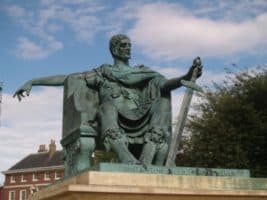
What do you think are the most significant events in history? On this episode of 5 Minutes in Church History, Dr. Stephen Nichols takes us through the emergence of Christendom, the rise of Islam, the Reformation, the Enlightenment, and more.
Happy New Year to you all. We like the number five here on 5 Minutes in Church History, so we’re going to review the top five events in history. I’ll qualify that to say AD history, so the last 2,000 years. Of course, this is my opinion, and you’re entitled to your choices. This is apart from Christ and apart from the New Testament, which is the event of all history. With those caveats in order, let’s go.
 First is the emergence of Christendom in the 300s. This has to do with Constantine and his alleged conversion. Coming out of that is the Nicene Creed of 325, and the 180 degree turn of the Roman Empire from being hostile to Christianity to becoming a friendly environment to Christianity.
First is the emergence of Christendom in the 300s. This has to do with Constantine and his alleged conversion. Coming out of that is the Nicene Creed of 325, and the 180 degree turn of the Roman Empire from being hostile to Christianity to becoming a friendly environment to Christianity.
Number two is the rise of Islam. Mohammed was born in 571, died in 632 somewhere around the age of forty. He had his first visions and founded Islam. Islam began there in Medina, spread to Mecca, and soon spread across the Arabian Peninsula. Today, roughly 25 percent of the world’s population is an adherent to the religion of Islam.
The third event in history is an event we love here on 5 Minutes in Church History: the Reformation. October 31, 1517. Of course, it did not occur in a vacuum, there were events leading up to it, and events that came after it. But what an important date and event. We owe much to the Reformers and to the Reformation in terms of the church and church’s practice, doctrine and theology, biblical studies, and even having the Bible in our own language. And let’s not forget the Reformation’s impact on culture and on the modern world.
The fourth event is the Enlightenment of the eighteenth century. Now this goes by several different names. In German it’s the “Aufklärung.” In English, it’s “the Enlightenment.” This was a political movement, a philosophical movement, a religious movement, and a cultural movement. In many ways it was politically an enlightenment from tyranny. This was the age of revolution, the eighteenth century. There was one here in America. There was one in Britain. There was a very bloody one in France. The common man was throwing off the shackles of the tyrant and of monarchs. It was a philosophical enlightenment that said, “Let’s not be bound by the church, or bound by the authority of Scripture, but let human reason roam free.” And so there was speaking of the Enlightenment as the age of reason. All of this of course means a cultural enlightenment.
There are several contenders for event number five. We could go to the twentieth century and talk about events in world history. The Potsdam Conference certainly was a major event. Not only was it the end of World War II, July 17 through August 2, 1945. It was also the beginning of the Cold War and the stalemate between the superpowers of the Soviet Union and the United States. That’s a contender. In January 1, 1983, we have ARPANET, the precursor to the Internet of the 1990s—that could be a contender. How about July 20th, 1969 and the landing on the moon?
Well, when it comes to church history, we’ve got all sorts of things in the twentieth century that could be contenders. We have the Edinburgh World Missionary Conference in June of 1910. We’ve got the Scopes Trial in 1925. I would actually make a case that the Chicago Statement on Biblical Inerrancy in 1978 was a watershed moment in church history.
These are the top five events in history.
Stay connected with 5 Minutes in Church History by getting the weekly podcast on iTunes, SoundCloud, or via RSS. You can also subscribe to the blog via RSS and follow us on Twitter and Facebook.
(This podcast is by Ligonier Ministries. Discovered by Christian Podcast Central and our community — copyright is owned by the publisher, not Christian Podcast Central, and audio is streamed directly from their servers.)